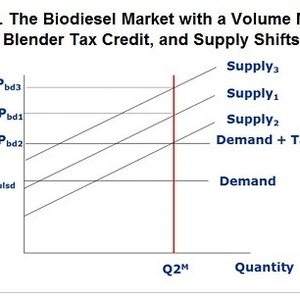D4 RIN prices suggest traders predict tax credit reinstatement

Source: FarmDocDaily, University of Illinois
September 11, 2015
BY Ron Kotrba
A drop in soybean oil prices since June has led to a decline in biodiesel prices, reducing the blend margin. Since D4 RIN values are a function of the blend margin and the two generally correlate, RIN prices have fallen too. But as University of Illinois economist Scott Irwin writes in a Sept. 10 FarmDocDaily post, “Why is the Price of Biodiesel RINs Plummeting?” the RIN price drop since June more than doubles the blend margin decline.
As Irwin points out, improving soybean production prospects in the U.S. and concerns about economic growth in China have led to nearly a 10-cent-per-pound drop in soybean oil prices since June. “With a binding volume mandate,” Irwin writes, “soybean oil prices are the main determinate of biodiesel prices, so the decline in soybean oil prices has led to a decline of more than [70] cents in the price of biodiesel,” from $3.30 to $2.57 per gallon. In the same time period, diesel prices have only dropped about 15 cents per gallon, from $1.80 to $1.65 per gallon.
This decline in biodiesel prices has been the main factor in narrowing the biodiesel blending margin by about 25 cents since mid-June. In the same time period, biomass-based diesel RINs have fallen by more than 50 cents a gallon, from 91 cents to 39 cents.
“Since the biodiesel blending margin, at least in theory, is equal to the RINs value (ignoring time value), we are left with the puzzling result that the decline in D4 RIN prices is slightly more than twice the size of the decline in biodiesel blending margins,” Irwin writes. “The most likely explanation for this puzzling result is that traders have been revising upward their estimate of the chance that the biodiesel tax credit will be reinstated for 2015. Since a tax credit reduces the RINs price when there is a binding volume mandate, it is rational to reduce D4 prices sharply if traders perceive a high chance of the credit being reinstated. Recent activity in the U.S. Senate is consistent with such an expectation.”
Advertisement
In July, the Senate Finance Committee passed a tax extenders package that includes two-year extensions of tax credits for biodiesel, renewable diesel and cellulosic biofuels. During the hearing, the committee accepted an amendment offered by Sen. Chuck Grassley, R-Iowa, to change the biodiesel fuels tax credit from a mixture credit to a production credit.
For Irwin’s complete posting, “Why is the Price of Biodiesel RINs Plummeting?” click here.
Advertisement
Related Stories
Moeve has reached a strategic agreement with Grupo Armas Trasmediterránea to supply 2G marine biofuels in the Canary Islands, with approximately 40,000 tons to be delivered through December 2025 under a long-term contract.
Castle & Cooke Aviation, a premier provider of luxury FBO services, now offers sustainable aviation fuel (SAF) from Avfuel Corp. at Van Nuys Airport (VNY) in Southern California. The SAF produced by Neste.
Editor's note from the Summer 2025 issue of Biodiesel Magazine
Legislation pending in the Illinois legislature aims to create a clean transportation standard (CTS) that would require a 25% reduction in in the lifecycle carbon intensity (CI) of ground transportation fuels within a 10-year period.
A notice published in the Federal Register by the U.S. EPA indicates that far fewer parties than originally anticipated have registered with the agency as biointermediate producers under the Renewable Fuel Standard.
Upcoming Events










